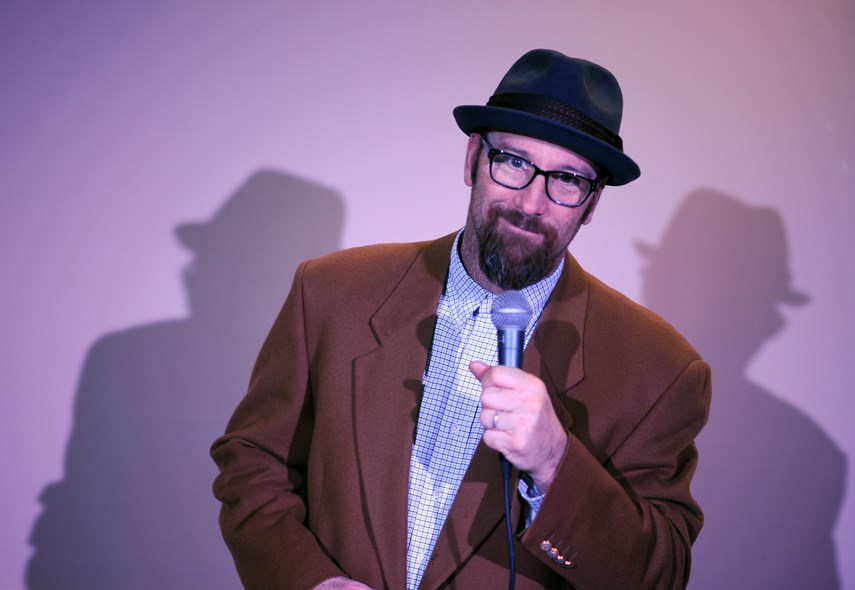When you let out a laugh, you leave room for something else to get in – a thought, a memory, or for Mark Smith, a little light.
Smith, a carpenter by profession and a comedian by trade, is getting set to emcee Stand Up For Recovery, a sober showcase scheduled for March 19 at the Alano Club in North Vancouver.
Smith has spent 20 years telling jokes on stage. For the last six years he’s been in recovery. At their best, the two pursuits are both akin to “poking a pinhole in a dark room,” Smith says.
It’s a way to let in some light and to see things differently, he explains.
“I love the energy there and I love doing standup and I love recovery.”
As he orders a sub sandwich during his lunch break (one shot of sriracha and two shots of ranch), Smith reflects on the six years he’s been in recovery.
Some observers have reasoned that stand-up comedy, which lends itself to late hours and free drinks, is an incubator for alcoholism. For Smith, the answer is simpler.
“The -ism of it all is the obsessive nature of the mind,” he says.
Not everyone has it, he continues. Some people can walk away from a half-finished cocktail. But the other folks, the ones that can’t ever walk away, find that an addiction can consume them.
“That’s all you think about,” he says.
Smith had those times when the disease had a hold of him.
He remembers being “rather inebriated” on stage, which he doesn’t recommend. An older comic once took him aside and told him that a comedian only has three tools on stage: a spotlight, a microphone, and their mind.
“Keep your tools sharp,” he advised Smith.
There’s an energy that good comedians have, Smith says, but it can be a fragile energy. Alcohol, marijuana and cocaine all have the effect of blunting the instrument and sapping your energy.
“When that energy’s not as vibrant as it could be, then it affects your show,” Smith says.
There was a stretch when he “fell into a hole,” he says.
But that was OK, he explains. Because along with losing everything came what he calls “the gift of desperation.”
“We only ask for help or say a prayer when we’re at the bottom of the pit with no way out,” he says.
It was around that time he found the Alano Club.
Located on East Second Street in the City of North Vancouver, the club hosts about 30 meetings a week for Alcoholics Anonymous, Narcotics Anonymous, Anorexics Bulimics Anonymous, and more.
“For me, it’s one of those doors that you walk through really broken and you start to put your life back together with a handshake,” Smith says.
Life can still be a struggle, Smith says. It’s expensive to live in North Vancouver. There’s stress and there’s things in his life he doesn’t like to talk about. But there’s also a lot of joy.
Most nights he goes to bed with gratitude and most mornings he wakes up with a smile, he says. It’s still hard, he says. But he’s recovering.
“You spent 20 years tearing your life apart, don’t expect it to be OK in five,” he says.
But one thing that happened is that he got back on stage.
When you’re sober and your tools are sharp, standup can be “almost an out of body experience,” he says.
“[Instead of] just saying something and having a reaction, you’re actually having an interaction,” he says. Then he laughs. “Wow, I gotta write that down.”
That doesn’t mean the audience is invited to talk back, he clarifies. But it does mean there’s “that human energy that human interaction is what we’re losing touch with,” he says.
“You can watch Netflix all you want but to come to a live show, oh my goodness. ... It’s a different universe.”
After two decades of standup, Smith is well aware of the ways the industry is unhealthy. But he’s also attuned to comedians with a different message.
“They actually have a life message where you leave the show feeling rather elated and elevated,” he says.
It doesn’t mean they’re doing motivational speeches, he adds. It’s more that they’re honest and they try to challenge, intrigue, maybe even illuminate.
“If you can back it up with a joke ... there’s an acceptance there.”
Smith started his career at Yuk Yuk’s in Edmonton, Alta.
“I was never the top notch comic, funniest guy in the room. But I was able to hold my own,” he says.
In the last few years he’s seen comedians he knew on Netflix or Just for Laughs.
“It’s kind of like your kid played hockey his whole life but never made the NHL,” he laughs.
But one spot where he excelled was in arranging shows. He’d find a venue, bring in comics and emcee the show. It made putting together a show for recovery a “no-brainer,” he says.
He also wanted to dismantle the notion that sobriety means serious and sedate.
“We have fun,” he says. “We laugh, we play, we love life.”
The March 19 show is for all ages, although, noting the “offbeat content” and possibly offensive language, he recommends no one younger than 15 attend.
But it may be a positive experience for kids interested in being on stage or in recovery.
Noting the lethal drugs on the street these days, Smith sighs.
“This is a much, much scarier world for my children to grow up into,” he says. “There’s stuff out there that kills you, like one-time use.”
He’s hoping people can find a little comfort or at least a few laughs in the show.
“Not dry humour, but it’s a dry show,” he says. “Come for the laughs, stay for the wellness.”
The show is set to feature comedian Patrick Maliha. For more information or for tickets click here.



